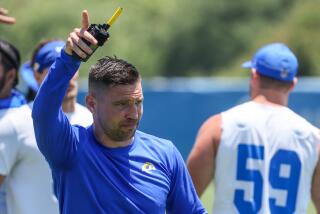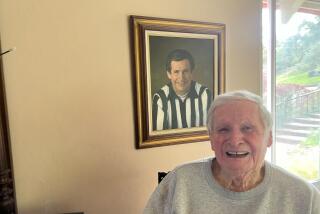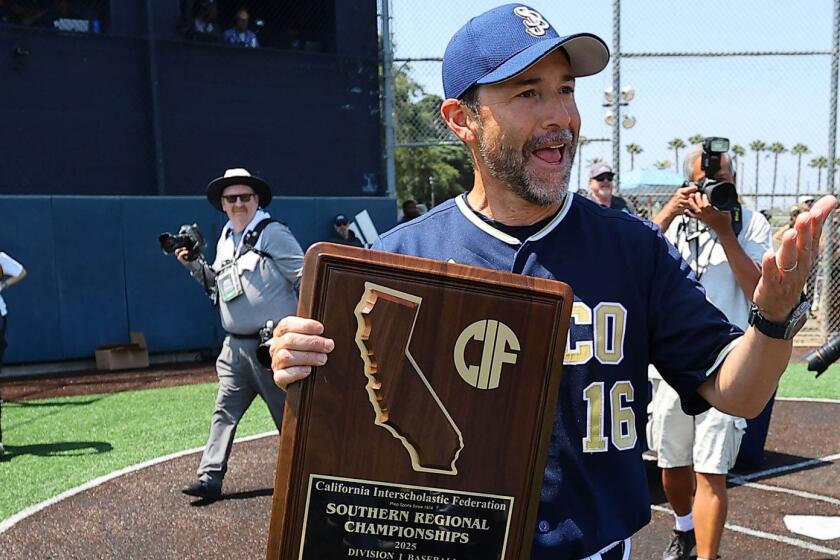Goodbye, Kingfish, Goodbye
- Share via
When Don Shula abdicated his 33-year throne, the final link of greatness to the NFL’s defining period was broken.
Don Shula finally is taking his football and leaving. Not to play quarterback. But to play father and husband and grandfather. He is not leaving the way he wanted to, fresh after a seventh Super Bowl appearance, riding the shoulders of his players, hearing fresh praises of his greatness. But what happened this season, the way free agency produced a gutless team that betrayed the dedication of its coach, will be remembered only as a blip on his screen of triumph.
So much departed with Shula when he left the Miami Dolphins’ training complex recently, eased out by owner Wayne Huizenga after 33 years as a head coach and a 347-173-6 record. In the sound-bite era of the ‘90s, his resignation is today’s event, forgotten amid tomorrow’s newest development. But hit the stop button on the remote just this once. Come ride with Shula on his players’ shoulders one last time; enjoy the wonderment of where he has been and what he has meant and why pro football isn’t quite the same today as it was yesterday.
Halas, Lombardi, Brown . . . Shula isn’t so young anymore, but age hasn’t clouded his memory of one of his first NFL meetings. He looked around the room and saw George Halas. And Vince Lombardi and Paul Brown. A very young Don Shula was there, too. The executive was in awe of such company. And when he heard that Shula, the final link of greatness that kept the NFL past chained to the NFL present, was retiring, he felt a pain in his gut.
It is the same pain that brought Tex Schramm to tears, that caused Pete Rozelle to reflect somberly on what used to be and moved former Dolphin Manny Fernandez to declare, “It’s almost like you are talking about the end of football in Miami.”
“I see him as the god of football,” Dolphins running back Terry Kirby says. Shula surely was the last on-field god left from an era that defined the NFL, vaulted the league into elite status and turned the game into an American triumph. He comes from an era that we now contemplate with growing nostalgia; we yearn again for one last pep talk from Lombardi, one final sideline tirade from Halas, one concluding play call from Brown. As long as Shula coached, we could see the past, when football was more fun and the world of business less intrusive. Of course, it was never that pure--just ask Shula even now how he feels about the World Football League’s raid on the Dolphins in the mid-’70s--but at least there was no free agency or franchise movement. Coaches were in charge; players didn’t ask why.
“Society changes and Don changed with it,” Bob Griese says. “But I would have to think that things might have been a little more fun for him before life got more complex. One of his gifts, though, was he never looked back and worried about the past. He was always moving on, looking at the future and how he could win. I don’t see one change on how he does things. He still prepared meticulously. He still was a details man. You still knew that at a particular time every day, he was doing the same thing he did 15 years ago. I don’t think his hunger left him. Just don’t tell me he can’t still match anyone with X’s and O’s.”
With Shula gone, an age of coaching dictatorship goes with him--an era built on huge tempers and and an obsession with rigid rules and regulations. Ask Shula now what he is most proud of, and he will tell you that he was honest and consistent and that his teams stayed within the rules. Almost every season, it seemed, the Dolphins led the league in fewest yards penalized. Not in 1995; only eight teams collected more penalty yards. “I don’t know what the hell happened,” he says. Look at the era, Don.
But even this generation of players can’t go untouched by Shula’s genius, even if it wanted to avoid it. His legacy is in the rules that have so changed the game over the last 20 years. As a member of the competition committee since 1975--he became co-chairman in 1993--Shula has pushed for regulations that have helped protect quarterbacks from unnecessary injuries and backed innovations that have opened up offenses and reduced domination by defenses. And he trumpeted instant replay, which someday could return. He’ll remain on that committee, a sort of elder statesman of football, a guy who can remember how Halas and Lombardi and Brown would want the game played.
Namath, Unitas, Griese . . . Before he became the biggest winner in NFL history, Shula was a loser. Couldn’t win a championship. Joe Namath predicted a Super Bowl victory and then grabbed one by downing Shula’s Colts. That’s why even today Shula glows any time his 1972 team, the 17-0 Dolphins, is mentioned. Can’t win, huh? Just see if anyone can match that record.
It is a mark of the man’s enormous ego that he doesn’t want that mark broken. None of this records-are-made-to-be-smashed baloney for Shula. His place in history is important to him. He wants to be the coach with no defeats, the coach of 17-0. He knows what he has accomplished and where that places him among the greats. It is a status he enjoys.
As painful as last week’s events were to him personally, at least it solidified his stature. The farewell news conference filled a huge team meeting room with television cameras and anxious reporters. He was surrounded by former players and even Raymond Floyd, a next-door neighbor. Bob Costas and Larry King requested one-on-one interviews. Shula was treated as if he were royalty.
And he put up a brave front. He smiled and joked, giving only the slightest indications that this was not a decision he favored (“Wayne came down and then made the final decisions as to what direction I wanted to go and what direction Wayne wanted to go”). Fire his staff, Huizenga told him. Shake up the front office, he was told. Coach a few more years, too, if you want, even though Shula knew he wanted to stay just one more season. Instead, Shula, who began the week insisting he would finish his contract, took a lucrative payment from Huizenga and became the Dolphins’ vice chairman. Duties undefined, office off-campus. Shula had too much loyalty even to mediocre assistants to become a grim reaper this deep into his career.
Maybe he should have been allowed to finish up next season and bow out on his own terms. Maybe he was owed that much, but this is not a fantasy sports world anymore. Huizenga saw a roster filled with 19 first-round draft choices, that had been assembled with the help of $18 million in signing bonuses, tumble backward, finally falling apart in an astonishingly inept performance against the Buffalo Bills in the playoffs. Shula needed to be 33 again, when he took over the Baltimore Colts in his first head-coaching assignment and had the audacity to tell 30-year-old Johnny Unitas a thing or two about playing quarterback. Instead, the perception in south Florida was that he no longer was capable of guiding a championship team, that a coach named Jimmy could do better. His friends say no, but Shula would be the first to admit a coach is ultimately responsible for a team’s results--and the coach of these Dolphins did a mediocre job.
“Geez,” Colts receiver Ray Berry once told Shula, “you need to work on your temper.” Shula still does; the fire in his belly can rage in an instant. It’s just that, unlike Unitas, these current players stopped listening.
Marino, Clayton, Cox . . . When Shula concluded the news conference, Dan Marino walked over and embraced his coach. They exchanged whispers, then Shula waved and walked, smiling, out a side door. Marino lingered momentarily, his head bowed, before disappearing.
Shula and Marino are not close; certainly, their relationship never rivaled the one he has with Griese, who calls him “Shues” and has become Shula’s image protector. But these past few seasons, as Shula caught and passed Halas in coaching victories and Marino stalked Fran Tarkenton’s passing records, the two have been linked more than ever. No longer surrounded by other gifted teammates, Marino became Shula’s final superstar. All elite coaches are paired with a gifted quarterback--Halas and Luckman, Brown and Graham, Lombardi and Starr, Landry and Staubach--but Shula had a run of three: Unitas, Griese, Marino. The first two have rings; Marino has disappointments.
Shula’s final quest this season to buy a Super Bowl with free agency was as much for Marino as it was for his own ego. Shula has gone 22 years since his last championship; in major sports, only Gene Mauch coached a longer period (29 years) without a title interrupting the string of years. Marino has absorbed 13 seasons of disappointments. He had one shot, in 1984, for a ring, but the Dolphins were whipped by the 49ers in the Super Bowl. That’s it. “He’s running out of time,” Shula acknowledges. “I hope he still can get one.”
The brilliance of Shula has been his ability to win with Hall of Fame quarterbacks, with journeyman quarterbacks (Earl Morrall, David Woodley) and with halfbacks playing quarterback (Tom Matte). His failure has been his inability as a personnel man to surround his quarterbacks over the last 22 years with enough quality players to win at least one more championship.
In the Marino era, how many years have the Dolphins lacked a running game or a physical defense? Shula should have fired himself as a general manager years ago instead of maintaining such ironclad control over the organization. Just look at the mess he made of the roster this season. He brought in big-name players and forgot a fundamental element of any champion: chemistry. His ragtag outfit didn’t get along. Bryan Cox? He symbolizes the pitiful sportsmanship and lack of class that Shula once despised. But Cox may be back with the Dolphins next season. And Shula is gone.
“That 1972 team, they loved to play hard and they liked to play as a team,” says Shula, which is just what his 1995 club didn’t do.
But even four games into this season, when the Dolphins were undefeated, Shula thought they would live up to their early rating as Super Bowl contenders. By the new year, he called it the most frustrating and embarrassing season of his career.
“He was the guy who really helped me in my learning process early, because he put so much pressure on me to be successful, put pressure on me to learn the offense at a young age,” Marino says. “Everybody should appreciate what this man has done for all of us here in south Florida and for the Dolphins.” But the Now Generation only sees Jimmy Johnson’s cemented locks.
Dave Shula, Mike Shula, Mary Anne Shula . . . A day after he turned 66, Don Shula said he was starting the first day of the rest of his life. He said he now would have more time to get to know his children and grandchildren. It was a sad commentary on what it takes to be a successful coach, at least in his mind. Family came second, football first. But in sons Mike (Chicago Bears assistant) and Dave (Cincinnati Bengals head coach), the Shula football line will continue. And Shula is more content than he would have been in the past to handle the uncharted area of retirement.
After losing his first wife, Dorothy, to cancer in 1991, Shula was deeply unhappy. But his marriage to Mary Anne in 1993 has transformed him off the field into sort of a teen-age lovebird. They wink at each other and kiss in public. And he goes places and tries hobbies that he would never have even thought about 15 years ago. The rest of the Shula clan remains extremely bitter about what has happened to its patriarch; his wife is convinced the time had come for him to move on.
“I’m going to do my best to be happy,” Shula says. He deserves that much.
More to Read
Go beyond the scoreboard
Get the latest on L.A.'s teams in the daily Sports Report newsletter.
You may occasionally receive promotional content from the Los Angeles Times.










